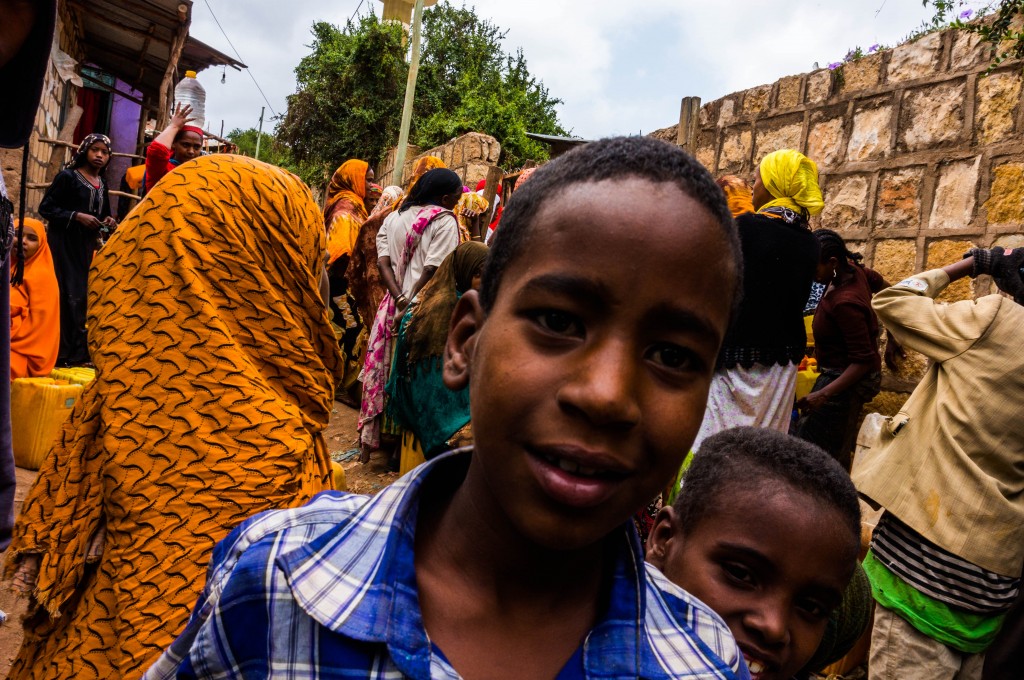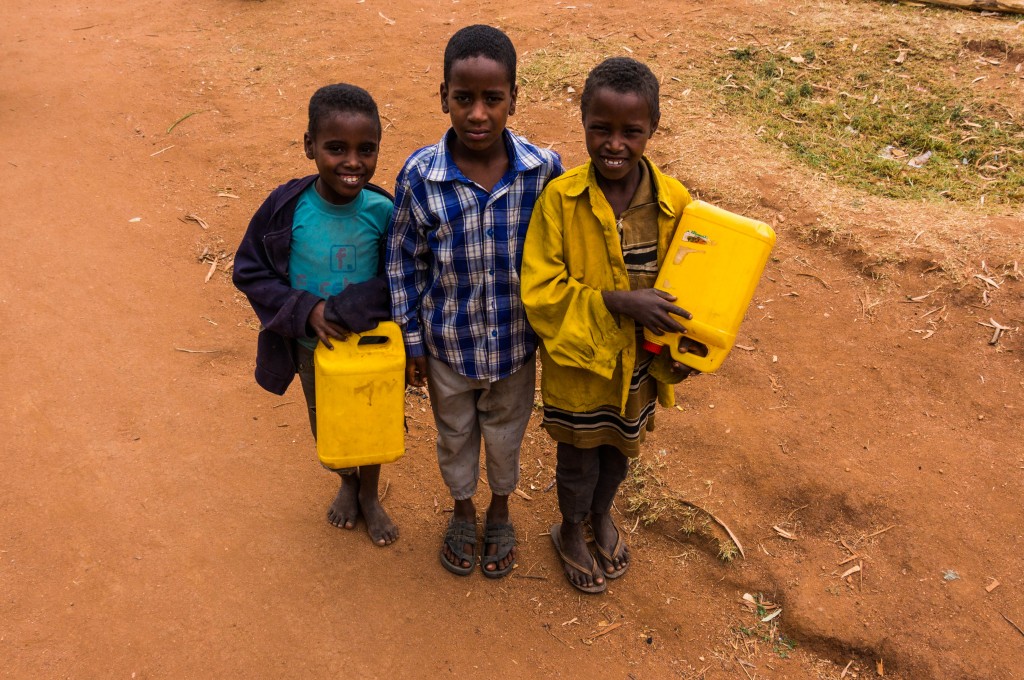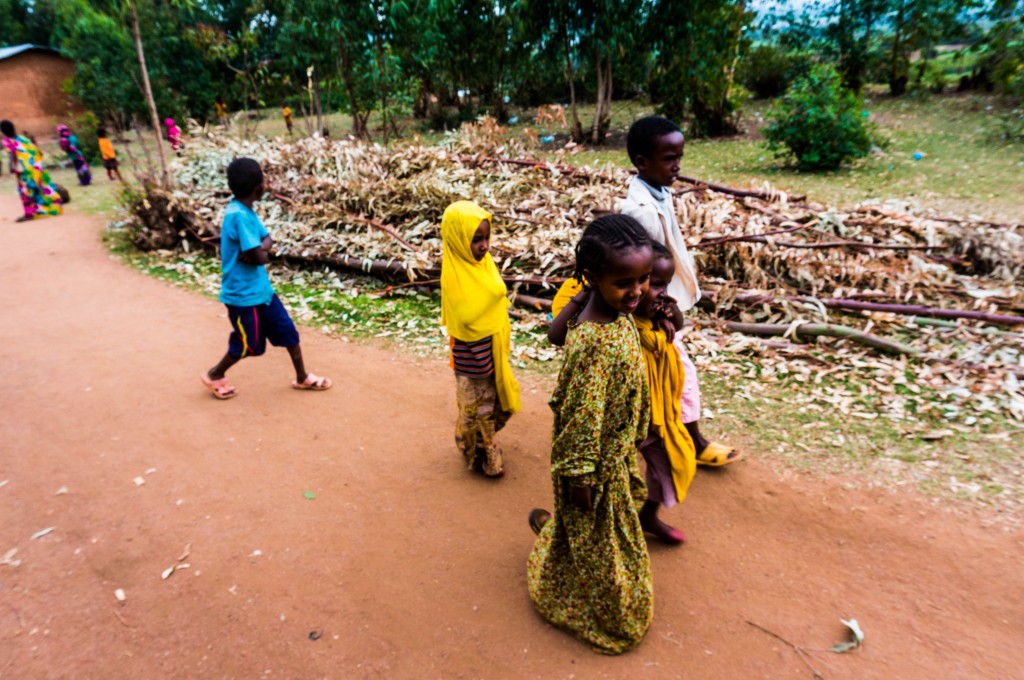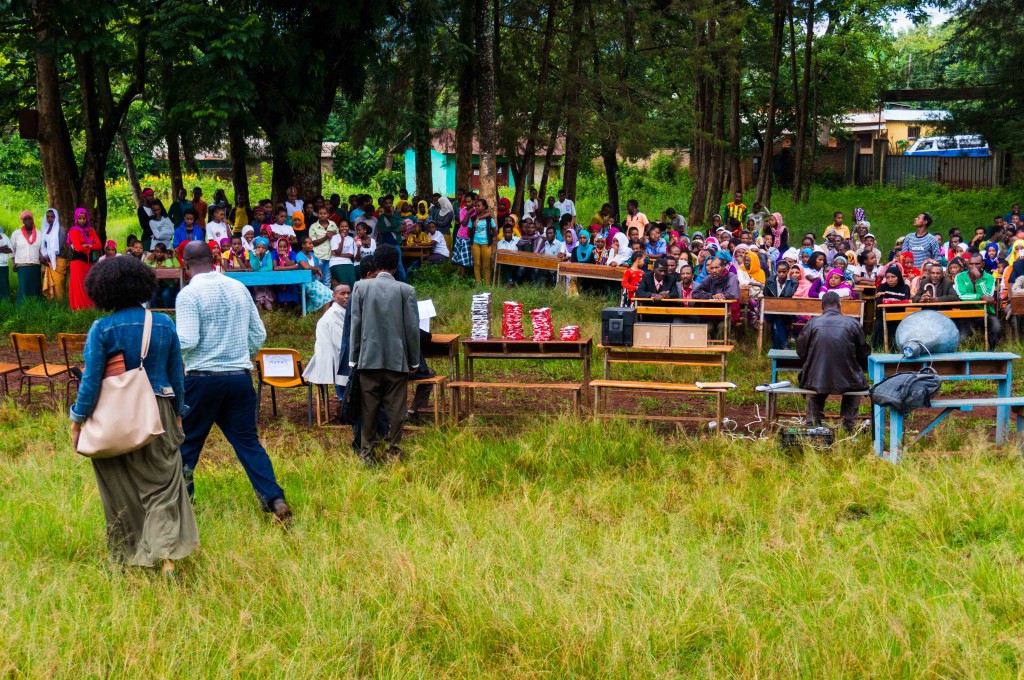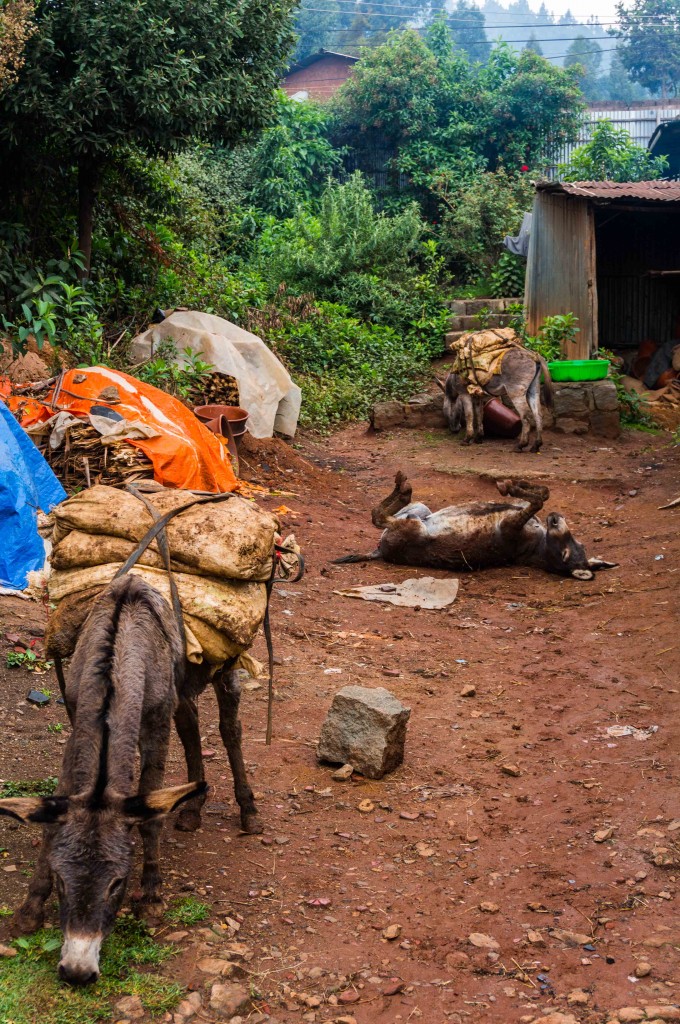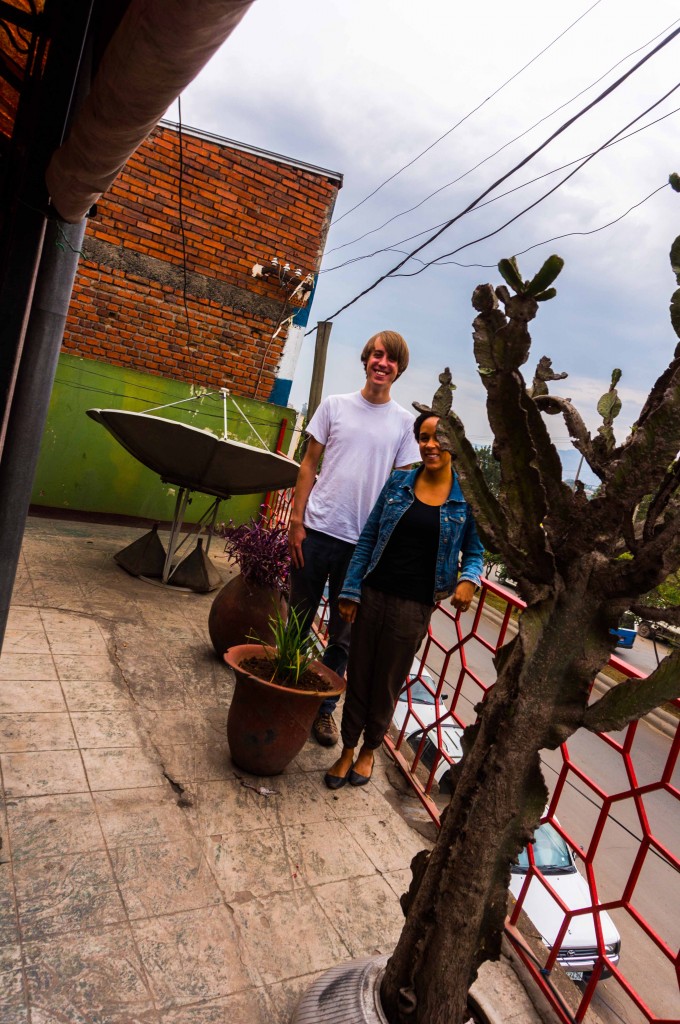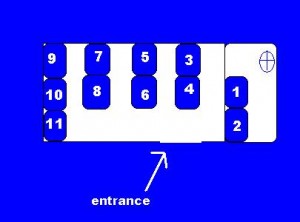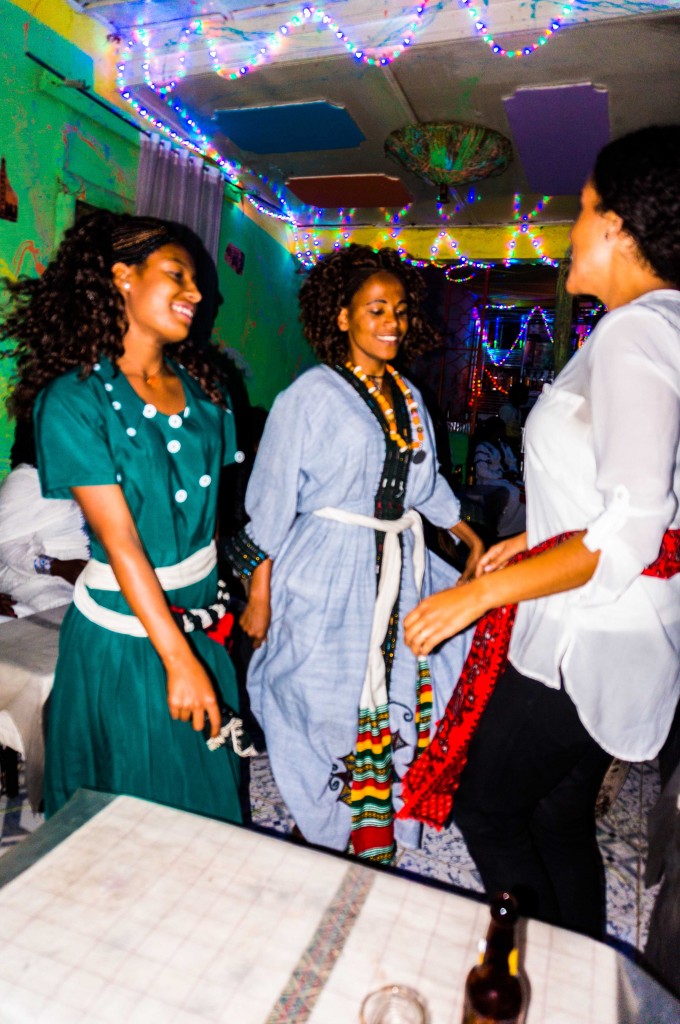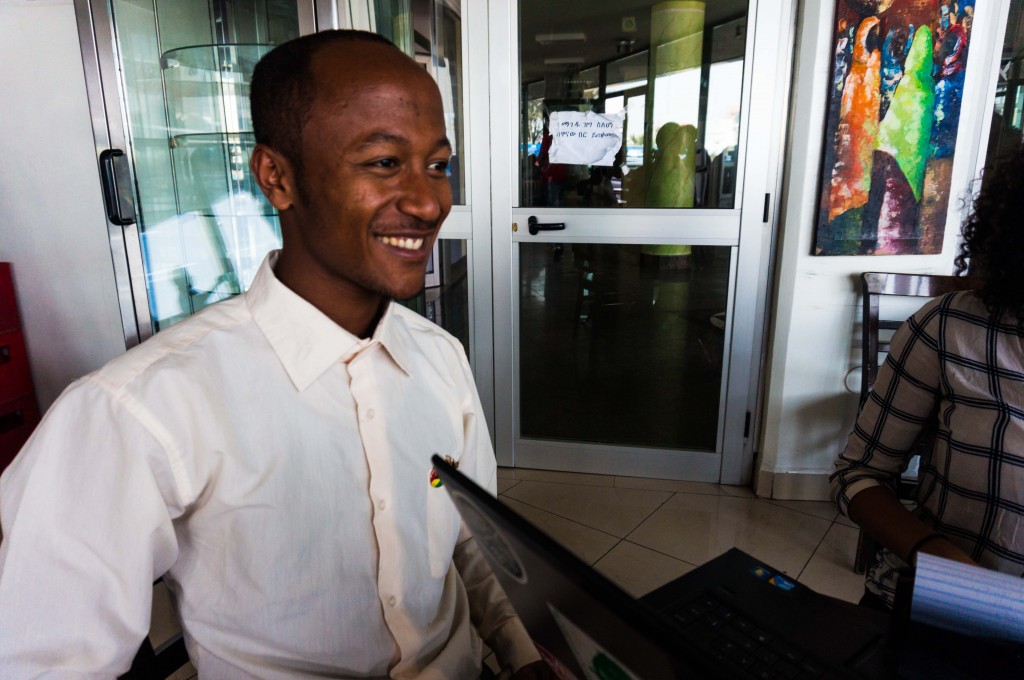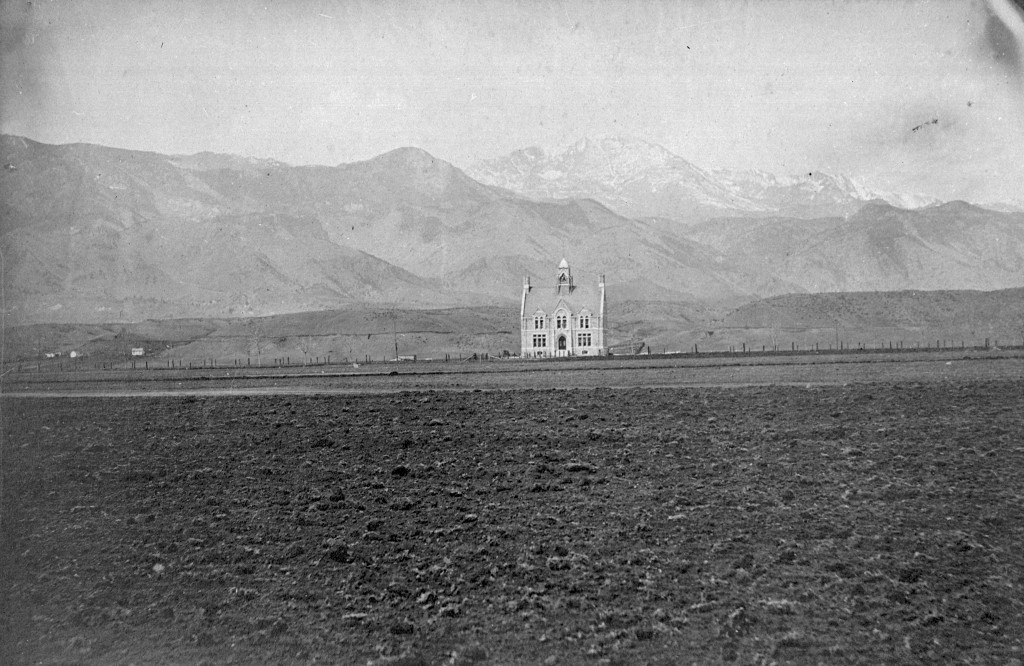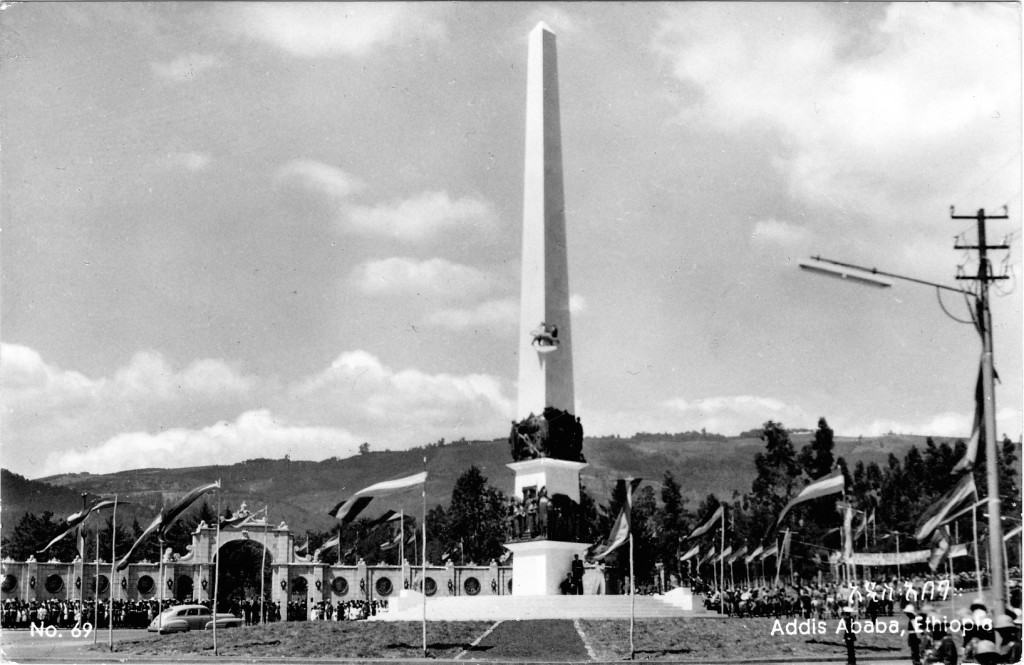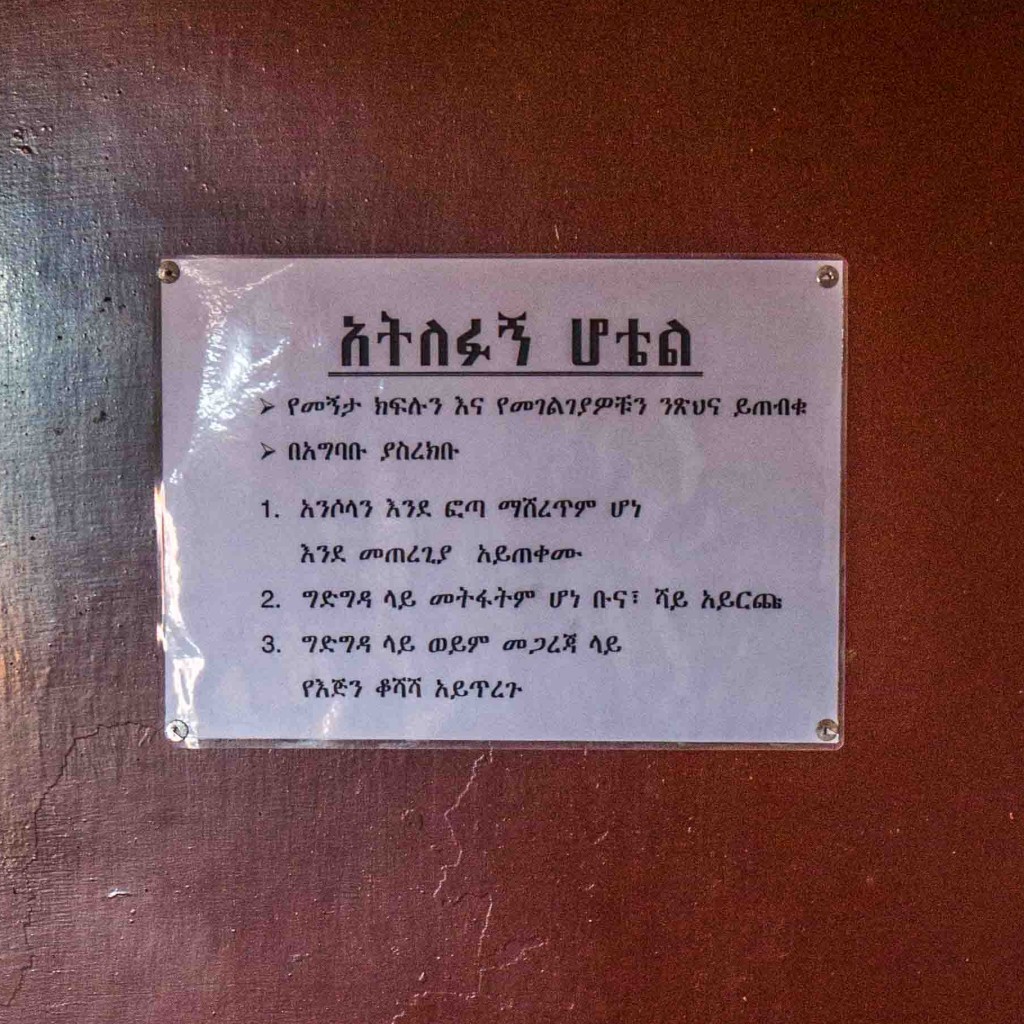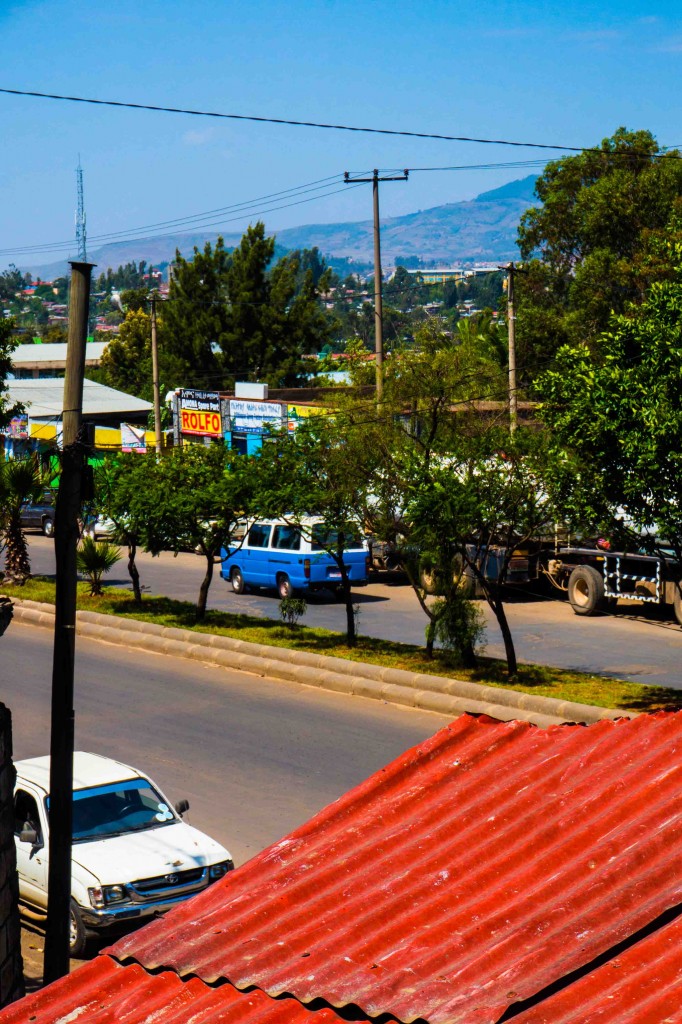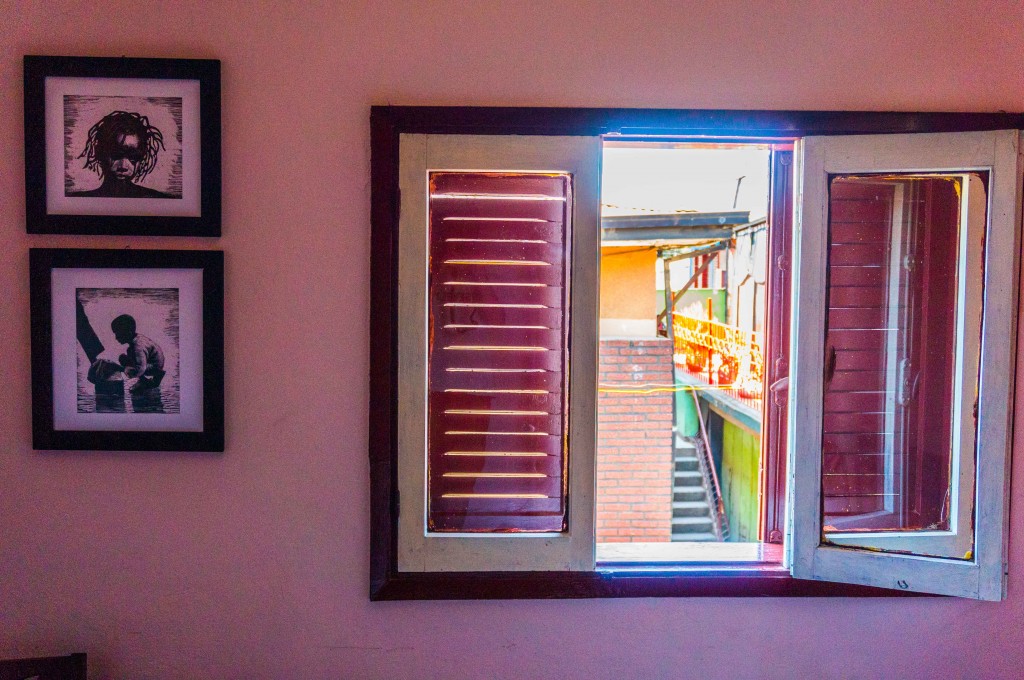Archive for category Phoenix McLaughlin
The Kids of Gonda Boya
Posted by Phoenix McLaughlin in Ethiopia, Phoenix McLaughlin on August 10, 2014
It is impossible to take a picture of just one kid in a town in Ethiopia. Our site visit in the photo-hungry, kid-heavy village of Gonda Boya a few weeks ago made that clear.
We spent July 14th trough 21st in the Harar area in Ethiopia’s dry Eastern region. Harar itself is an impressive city with an impressive history to match; it’s an ancient city with 99 mosques and a distinct language packed into the confines of the old walls. But our work did not bring us within those walls—we had two topics of focus in the area nearby: the work of the Hararghe Catholic Secretariat (HCS) and the water situation in Gonda Boya. I’ll get to HCS in another blog post, because it was really Gonda Boya that brought out the kids in force. The village of 2,000 rubs up against the walls of Haramaya University, one of Ethiopia’s major universities, and has very limited water access.
Around mid-July, Katie and I made it out there and were shown around the village by a community leader. While walking around, we were almost constantly surrounded by children. There would be a long line behind us on the tighter paths, and a wide formation to our sides when we were in the open areas. Taking a picture of just one was not an option; as soon as one of us brought up our camera, they would all crowd around whoever or whatever was our intended target. Then they would all want to see the picture of themselves on our camera of course. Some would wander with us far from their home, and our host would occasionally scold them and scare them back. Some were very shy, but most were not. Some were carrying jerry cans of water.
Here they are:

Two at Sunset
Peaks and Valleys
Posted by Phoenix McLaughlin in Ethiopia, Phoenix McLaughlin on August 10, 2014
I wrote this a few days before returning home, around August 3rd or so. It was meant to be a brief explanation of why I hadn’t posted a blog in awhile, and I feel like it is still worth mentioning before I start doing back posts about the past few weeks.
The peaks and valleys, the highs and lows, the ups and downs—they are all major features of international travel. The midway slump is well documented among travelers, whether they are tourists or emigrants. As my lack of blogging recently can attest to, I was not impervious to the downturn on this trip to Ethiopia. The problem is easily diagnosed and it is simple to trace its origins, although a cure is unknown. The problem is that for the first month or so, the traveler is enamored with their new and unusual surroundings. The food is different, the language is different, the scenery is different, the smell is different, and so on. It is all exciting, and it is all noteworthy; it is also more blogworthy.
Or, I should say, it feels more blogworthy. The new country is no less fascinating, but after awhile, the wonder wears off. Things are not less interesting or less important, but their effect is diminished on the traveler. After my last blog post about seeing a graduation in Jimma, I reached that valley of shoulder shrugging. We continued to travel all over Ethiopia and our work really took off, but the intrigue of everyday life—the foundation of travel blogging—dissipated. With the onset of a traveler’s slump, it became much more difficult to sort out the interesting from the mundane, especially for presentation to a distant audience. Hence, I have been blogless.
But do not fear, for this is not a blog stating the events of the last three weeks shall never see the light of the internet. It is a small elucidation on the reason why my part of the blog has been empty recently (i.e. an excuse). Over the coming days and weeks, Katie and I will be putting a lot of work into creating the final outputs of our work, attempting to transform the huge amount of material we gathered into presentable tidbits of media for your viewing pleasure. During that time, I will surely be reflecting on the many places we’ve been and the many things I want to say over this platform, and I will work on filling in the gaps.
Going Home
Posted by Phoenix McLaughlin in Ethiopia, Phoenix McLaughlin on August 7, 2014
I am sitting in the Frankfurt airport right now waiting to board my flight to Boston. There is certainly a lot to say as my time in Ethiopia ends, but I won’t be saying much of it right now since I have about ten minutes until my flight boards.
I do have time to say this: being a Peacebuilder Fellow in Ethiopia has been the most rewarding work I have ever done. I was endlessly frustrated by many things while living and traveling in Ethiopia, but the work itself was nothing short of inspiring. Almost every organization and individual we contacted went out of their way to help us and led us to amazing stories of the struggles and progress surrounding water in Ethiopia. I would typically feel an incredible sense of exhaustion before our meetings, primarily stemming from the dread of dealing with the transportation system in Addis and elsewhere. But I would leave each meeting with a smile on my face. We spoke to aid workers, academics, government officials, teachers, engineers, farmers, community leaders, and generally concerned citizens, and all of them had something important to say. Even after meeting dozens of individuals over two months, we were still learning many new things at our meetings towards the end. There was simply no shortage of new issues and new perspectives on old issues, all of which were incredibly valuable.
Now I’m going home. I can’t pretend to be sad about that fact in general, but I am sad that my time collecting stories has ended. Fortunately, over the coming weeks I will get to reflect on the many stories we did gather as Katie and I work on creating our final products.
Graduation Day
Posted by Phoenix McLaughlin in Ethiopia, Phoenix McLaughlin on July 10, 2014
Sunday we attended a 9th and 10th grade graduation. As is evident in my last post, we were under the impression that we would be attending a graduation for the man we were going to meet in Jimma. He did graduate that weekend, but it happened before we arrived. Instead, we were going to the graduation of the school he taught at, a high school in town.
Our presence was far more significant than I had expected. I thought that we would just be led to a seat in the back to observe the ceremony, and then be on our way to talk with our host somewhere else. Instead, we were immediately shuffled into the principal’s office upon arriving where we were formally introduced to the principal, two vice principals, and a local master’s student, and many pictures were taken. After being given a brief tour of the school, we walked over to the collection of classroom desks under a patch of trees where ceremony would be held. As you could probably guess at this point, we were not given a seat in the back, but were shown to some chairs at the front facing the audience. We sat with the teachers to our left (there were 16 for the 1,000+ kids in the school) as the administrators to our right began their various speeches.
All in all, the graduation was not too different from any other. Music from a drum line started off the ceremony, people made some speeches, some names were read, and people clapped. A few notable differences were the addition of a skit, people applaud in rhythm, and the administrators, having more sense than those in the U.S., don’t read off each person’s name, but instead present prizes to the top students and declare everyone graduated.
Of course, my experience at the graduation was different than others I’ve attended given my role as a notable guest. After the ceremony, we again spoke with one of the vice principals, who explained to us the significance of our visit. He told us that, above all else, our presence was a symbol of peace. I am paraphrasing liberally here, but he saw it as a chance for us to witness the peace in their community, as well as to express the peace and brotherhood between our country and theirs. We later learned that one of those pictures of us taken earlier would be printed out and hung on the wall to commemorate our visit.
A healthy dose of imposter syndrome came with this news—none of the other graduations I’ve been at ended with my picture being hung on a wall, so why should this one? While I do think the project we are here for is a good one, receiving such pomp and circumstance was more than a bit frightening.
But the more I thought about why I am here in Ethiopia, the less insane it seemed. I still feel unworthy of the extent of special treatment, but the sentiment is sound. I am here on a Peacebuilder Fellowship, which is built on the belief that peacemaking is not the exclusive realm of presidents and generals. In fact, it is best performed by regular people. Sometimes it can take a lot of work, but sometimes all it takes is showing up. On Sunday all it required was showing up at the school and telling them that we wanted to hear what they’re up to. It resulted in special meetings, special seats, and special pictures, all of which seemed over the top. But more importantly, it resulted in at least one man feeling that there was peace to be had.
The fundamental peacebuilding aspect of this fellowship had been pushed to the back of my mind by thinking too hard about the research side of the project. I have been thinking of myself exclusively as a researcher, but the fellowship is titled “Peacebuilder” for a reason. I may be performing research, but it is with the intention of constructing a good relationship between the people of two countries. The visit to the school became a quick reminder of this goal. I unexpectedly upgraded from researcher to peacebuilder within a few hours, and I won’t forget it. It was graduation day for me too, I suppose.
Getting Started
Posted by Phoenix McLaughlin in Ethiopia, Phoenix McLaughlin on July 10, 2014
This was written Saturday, July 5th, after arriving in Jimma.
I have now been in Ethiopia for over a month, and I think it is fair to officially declare this week as the beginning of real fieldwork. I am writing this from a hotel room in Jimma, having just arrived from a seven-hour bus ride (it was supposed to take four). We will be here for a few days meeting with an environmental activist before heading back to Addis. Then we’ll go to a town near Adama to see the water management techniques there. Then we’ll go to a village near Harar to see a well-building project. Then we’ll go to Mekele. Then Arba Minch. Then Bahir Dar. Then we’ll go home.
I’ve become a researcher all of a sudden, hopping from city to city, town to town to dig up stories. I spent a month as something else. We did a few interviews in that time, and spent plenty of time in meetings to set up future interviews, but my days seemed to be filled with activities primarily aimed at setting up a home base. It took weeks to find a house, weeks to figure out food, weeks to decide where to keep things on me (not in my pocket it turns out), and weeks to set up meetings. I have been less of a peacebuilder and more of a homebuilder. I’ve been an adapting species shedding vestigial limbs like eating utensils and a driver’s license.
Not everything is settled, but it is enough so that we can leave Addis. We needed to get everything set up so we could leave it behind. Now here we are in Jimma, preparing to meet an environmental activist in the morning to see his graduation before continuing on to the business at hand: everything water in Ethiopia.
Ethiopian club music is being blasted outside my hotel room door, the sink doesn’t drain, and I’m tired, but it’s good to be here. We’re here to dive into our work for the first time, and I can’t wait to start.
Oddities
Posted by Phoenix McLaughlin in Ethiopia, Phoenix McLaughlin on June 30, 2014
A donkey ran into me today. It did not simply brush or nudge me; it plowed into the side of my leg with force, and, dare I say, purpose. I was left physically unscathed by the event, but my view of the animal kingdom has surely been scarred by the donkey’s blatant disregard of decency.
I was standing on the sidewalk next to Katie as she attempted to buy guacamole ingredients from a fruit stand (and having a somewhat difficult time), unaware of the coming danger. Amid the normal din of street noise, I heard the familiar cry of “Hallo! Mister! Hallo! Sir!” It is something I hear at least ten times a day as various people try and get my attention either to sell me something or purely for entertainment. Today, it turns out, it meant that I was about to be struck by a donkey. A few seconds later, the donkey’s face ungracefully met my thigh and pushed me a few feet down the street. Everyone around—Katie, the shopkeepers, and especially myself—were surprised at first. But it did not take more than a couple seconds for the surprise to turn into laughter. The owner of the donkeys continued on down the street as if nothing happened, and soon enough we returned to buying food as if nothing happened as well.
A few days ago, Katie and I asked someone to take our picture at the request of our director, Pushpa. She needed a picture of the two of us in Addis to put online. We were at our old hostel, which has a balcony overlooking the street, and we asked one of the employees to take our picture. He immediately directed us to another one of the employees, implying that he was the true photographer of the bunch. Sure enough, once being shown the correct button to push, he moved around us snapping pictures at all angles. It looked like he pushed the button fifteen or twenty times, yet we later discovered he only managed to take three pictures. In all three, the large cactus near us featured prominently in the photo. Fortunately there was one in which the cactus only covered part of Katie’s head, so we used that one.
Most of the minibuses are covered in stickers of Jesus, Mary, or other Christian figures. I would estimate that about 90% of the stickers on minibuses are Christian, and that’s not that hard to understand, since a lot of people in Addis are very religious. The other 10%, however, are totally inexplicable. These stickers range from “Don’t mess with Texas” to “Power Steering”, but the most common non-Christian sticker is, without a doubt, the Apple logo.
You can’t explain that.
Firengi in the Minibus
Posted by Phoenix McLaughlin in Ethiopia, Phoenix McLaughlin on June 22, 2014
I beat a record tonight. It was only a personal record, but a significant one nonetheless. I am talking of course, about the amount of human being fit into an Addis minibus.
I say “amount of human being” instead of “number of people” because that record was not beaten. That remains at 20 people fit into a 12-passenger van. However, that number had previously included teenage girls and small children who fit more easily into the small space. The record set tonight was the squeezing-in of 20 full-grown, fairly large men, including myself, into a van headed from Bole to Mexico.
For reference, here is what the layout of the van is supposed to look like:
And here is the reality (numbered in order of non-seats typically taken first):
It was truly something special.
That statement is not made entirely in jest either—I do think there is something important about cramming into a sputtering van with the rest of the town. This occurred to me largely because that record was set as I was on my way home from the first bona fide tourist trap I’ve experienced in Addis Ababa.
Due to some cab driver miscommunication, Katie, Pushpa (who just arrived!), and I accidentally ended up at a restaurant that we had tried—and failed—to get to last week. It came well recommended by the internet, so we figured it must be good. The food was excellent no doubt, and they put on a music and dance show too. But we certainly paid the price, ending up with a bill about three times the normal amount for dinner here.
The restaurant was packed to the brim with people, including a group of about 30 Americans sitting next to us. It may seem like a silly qualm, but I couldn’t help but think later that it was sad that they probably wouldn’t get the experience of smashing themselves into a van filled with Amharic and poorly vented exhaust fumes.
There are a lot of places my mind could have gone from here. I have been trained to connect everything to broad social implications, and there was no shortage of such implications to be had from contemplating the experience of this group of Americans, who were here on a charity/mission trip. At the very least, I could have thought about the significance of their presumed lack of experience with a popular form of local transportation.
But honestly, my mind was blank in those places. I just wish they had the chance to stuff into a minibus full of strangers.
I don’t know what, if anything, riding on minibuses has taught me, what it means, or if it is useful. But it feels important. At any rate, it’s kind of fun, and you certainly don’t get to do it everyday back home.
I had the same thought regarding the dancing we were all watching in this restaurant. At one point they did a dance that was in a traditional Northern Ethiopian style. When Katie and I were out on my birthday, we happened to be led to a small bar in a isolated part of town that was full of this traditional Northern Ethiopian song and dance, and it was amazing. The way the dancers moved their bodies was nothing short of incredible, not to mention surreal; it was if someone possessed was popping and locking. The dance we saw in the restaurant simply did not display the intensity or personality of the dancing we saw in that bar. Again, I don’t know what there was to learn from it, but I wish the big group of Americans could have had that experience.
Really, I wish everyone could have that experience. Seeing it was cool. It was fun. It was interesting. And yet so few people around the world will get to see it, let alone get there in a packed minibus.
I suppose my only recommendation to you, readers of this blog, is to come and do it yourself.
My Friend, Serendipity
Posted by Phoenix McLaughlin in Ethiopia, Phoenix McLaughlin on June 18, 2014
We are starting to understand the transportation system, we are almost settled on housing, and we are starting to meet with useful contacts. We are still in the very early stages of the research process here in Addis, but the pieces are slowly but surely falling into place.
Of course, I should really emphasize the word “falling” in that phrase. I cannot say that I have been putting pieces into their rightful place, carefully selecting and arranging the parts of the puzzle into their respective slots, so much as tossing a bunch into the air and counting on some to land in the right spot. This has been true for finding housing and transportation (each search for a taxi is a roll of the dice) just as much as finding contacts for our project. We have made two solid contacts so far, and each one was an accident.
The first one was an American. The day after I arrived, I was going into my room at the hotel as he was leaving his. A little conversation began after exchanging courtesy greetings, and eventually I discovered he was in Ethiopia to help build a well in a rural village where water is very scarce. On top of showing me some good restaurants and teaching me how to use the minibus system, he said he could help Katie and I go to the village where he is working and interview the community leaders there about the water situation. An all-around good connection to make in the hotel hallway. (You can check out his NGO, Concordia Humana here)
Contact number two came from the housing search. When I came to visit the house where I am now staying, I met a young Ethiopian guy, Joel, who lived there and helped to manage the place. Lo and behold, he has helped out for a few years with a water NGO, Drop of Water, started by a group of Ethiopian women at the university in Mekele. After I looked around the place, he gave me the full story of the organization, slideshow and all, and it was immediately clear that it could be a great group to work with. Yesterday he arranged a meeting for Katie and I with the woman who runs the organization. It was an excellent meeting, short but sweet. We learned more about Drop of Water and made plans to interview them tomorrow and tag along to one of their field site visits in a couple weeks. (You should take a look at their website here)
We have emailed and called people in a concerted effort to make contacts, and we will email and call a lot more. The next week will be largely filled with us trying to make useful connections and purposefully putting those pieces into place. But so far, it can’t be denied that the most useful tool has been chance.
History in the Streets
Posted by Phoenix McLaughlin in Ethiopia, Phoenix McLaughlin on June 10, 2014
This is what my college looked like when it was founded 140 years ago. I remember seeing this picture for the first time in that very building, Cutler Hall, and feeling a pang of historical awe. Now there are many buildings, not to mention grass and trees, that surround Cutler at Colorado College, and it is in the middle of the 600,000-person city of Colorado Springs. I can always remember the sensation of historical connection while looking at that picture. It gave me a glimpse of the story of the ground on which I stood. The places I have lived—Norway, Maine; Hampton, New Hampshire; and Colorado Springs, Colorado—tend to not be featured too strongly in the history books, so such insights into the places’ histories are rare.
Now I am walking the storied streets of Addis Ababa, Ethiopia, and I have been presented an opportunity for connecting to history on a level I had never imagined. The history of the city and the country is dramatic, and I found a source for discovering it in the book Cutting for Stone. It is a fantastic read. It is a semi-fictionalized autobiographical account of Addis in the mid-20th century, and it illuminates the period extremely well. The historical facts alone are interesting, but the book has brought them to life. It has made my walking around town feel much more significant.
Throughout the book and throughout Ethiopia, Haile Selassie is a monumental figure (although not always a positive one). He ruled Ethiopia for forty years and gave the country an air of stability and prestige that stood out to the world. It was because of this that Addis became a sort of capital for Africa—the African Union is based here, with the massive new headquarters visible from my hostel. Haile Selassie went beyond a mere political leader for some. A centerpiece of Rastafarian belief is that he was in fact the second coming of Jesus Christ—“an idea he didn’t mind his own people believing, but when it came from so far away and for reasons that he didn’t understand, made him wary.” He was traditionally believed to be a descendant of King Solomon and bore the appropriately modest title: His Imperial Majesty the King of Kings of Ethiopia, Conquering Lion of the Tribe of Judah, Elect of God. I am not used to walking on the same ground as people with those kinds of names. There are not many King of Kings in the U.S.
In the book, the main character sees the legendary Emperor Haile Selassie’s motorcade roll by one day—“The ground shook as the Ducatis slid past…His majesty’s green Rolls-Royce was polished to a mirrorlike finish. On a built-up seat, His Majesty looked out of windows specially constructed for monarchs to view and be viewed.” Yesterday, not long after reading this passage, I was treated to a motorcade experience of my own. The roads were closed off for miles all around; it took me 15 minutes of walking through streets emptied of cars before I finally came across the motorcade. A soldier halted me on the sidewalk to let some 25 cars, vans, and motorcycles scream by, each containing various men in suits. It would have been an interesting occasion regardless, but half expecting an emperor to roll by made it feel all the more important.
Alas, there was no emperor, since that title no longer exists in Ethiopia. Not much later in the book, a coup occurs, a fictionalized version of a real coup attempt in 1960. The book describes the clashing forces, the competition and eventual violence between the rebelling Imperial Bodyguard and the loyal Army, Air Force, and Police. Selassie was eventually deposed by another coup in 1974. With those images in mind, walking by the men in uniform sprinkled around the various armed forces headquarters in Addis gains new significance. The book has done the job of connecting them to their past, a tale of turmoil and conflict lasting into the 1990s.
One reason this history is so fascinating is that it is so recent. While my parents were pre-teens taking dance classes or playing ball in the yard, the man some considered to be the son of God was being overthrown by communists in the city in which I now live. Reading such a descriptive story set in Addis Ababa’s not-so-distant past has helped solidify a connection to that drama. I am only about halfway through Cutting for Stone, so I expect I will find some more history to revel in as I walk around Addis Ababa. It has already amplified my experience here to a great degree. Whether it be a college or a city, there is simply something extraordinary about tapping into the past of a place. I hope to do it more often.
Addis Ababa Helps Out
Posted by Phoenix McLaughlin in Ethiopia, Phoenix McLaughlin on June 4, 2014
I arrived in Addis Ababa last night. I have only been here for a little over 12 hours, but I have plenty of thoughts about the place already.
The main thing is that everybody has been extraordinarily helpful. This is good since I have needed a lot of help. When I first was leaving the airport, I needed a taxi to get to my hostel. The address given on the website was vague to say the least—it gave a neighborhood, but no street—and the woman I spoke with didn’t recognize the name. But without hesitation, she called the phone number listed on the page and asked where it was. It turns out she knew the place, she just didn’t recognize the spelling, so she got me a taxi and I was on my way.
When I arrived, the man in charge didn’t have my reservation. I showed him my printed confirmation, but he said he didn’t have it. Instead of turning me away, he had me take a seat in the restaurant while he figured it out. So I sat in the middle of a bunch of chattering Ethiopians and waited for him to return. I had little to do but stare at the TV, which was showing The Evil Dead for some reason, so I watched people be gruesomely murdered as I waited. The man (I still haven’t learned his name) returned periodically to let me know that his “guys” were trying to find me a room at another hotel. Sure enough, they found one, and he drove me over there, dropped me off, and gave me a key. He returned to pick me up in the morning and took me back to his hostel to give me a room. A shining example of customer service, he was.
I hope that the people I meet will continue to be as accommodating of my incompetence as those two were, because I know there is more to come. It is inevitable in a foreign country, especially a country as foreign as Ethiopia. I still need to find a phone, an apartment, and a good means of transportation, all of which offer plenty of opportunities to end up lost, confused, and in need of help. I’ve been served a quick reminder that independence only really works when you know how to do things. I don’t know how to do things here. Not yet, anyways. I expect it will be another week at least until I find some legs to stand on, and until then, I hope I don’t fall on too many locals.
I have been devising ideas on how to begin the actual research, and am keeping an eye out for any relevant information I come across, but it will be some time before I can really get into it. It would certainly be unwise to try and dive into it before becoming more grounded in this country, not to mention my partner doesn’t get here for another week. I look forward to truly starting to work though. My imaginings of how the project will come together have gotten a lot stronger since getting my first glimpse of this country. Hopefully it’ll start becoming reality soon.
